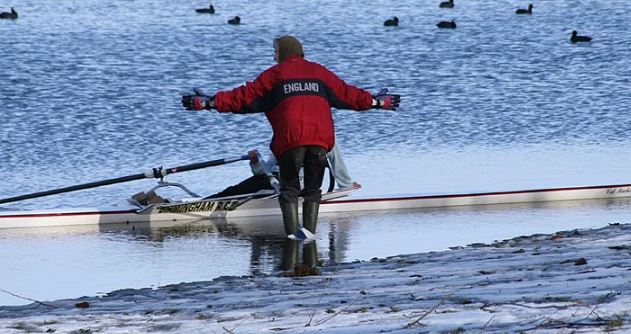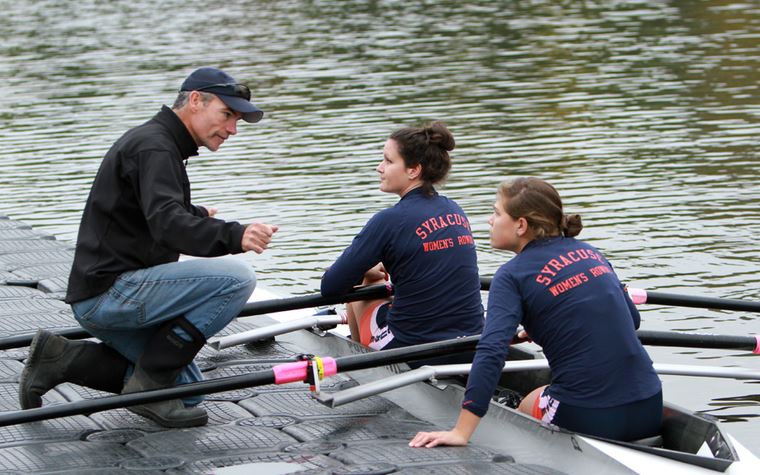Is the Athlete – Coach Relation a Winning Factor ?
I have seen two top international athletes who lost their coaches a few month ago. And I was wondering how they would perform in this your rowing season. Some pictures came back into my mind, when- years ago- my coach finished his work at my club. I felt really sad and wanted to stop rowing. I did not and many more great coaches came along.
But what made my relation so special with him? I started some research and found some really interesting information about the interaction of athletes and coaches. Some good ones from Coach Bo Hanson, a former successful rower.
Bo and Athletes Assessment are trying to clarify this athletes relation: What kind of impact will it have on their performance? You can find evidence in all kind of water sports: The coach athlete relationship is recognized as a performance factor. In cycling, kayaking and definitely in rowing. It is defined by the quality of understanding, respect, trust and predictability that exists between two or more people.
The role of a parent
What makes the relationship unique, is that it is drawn from our understanding of social science and how infants form attachment to their parents or what is also known as their primary care giver.
“Coaches are known as an athlete’s primary care giver. They are the people in the athletes lives who are expected to provide security, safety and emotional support. The fact is, we as human beings are conditioned to wanting this from our Coaches as a result of how we have been parented in our early childhood years.”
This says Bo Hanson from Athletes Assessment. Not the boat or the erg wins a championship… He believes people do. It seems, that top athletes apply their children – parent role to their coaches role. Parents provide a safe environment, are supportive and motivate the kids to gain successes. A great coach helps exploring and pushing the athletes limits, makes them taking risks to improve their performance. It is no wonder the coach – athlete relationship is a performance factor. It is in our genes. Learnt in socialisation


This has been researched in a study of athlete performance on the 2008 Canadian Olympic team. The study found the most significant contributor to a medal winning performance or personal best was a productive coach athlete relationship.
Building a beneficial relationship
A few years ago, the British Psycological Society stated, “that the coach–athlete relationship is not an add-on to, or by-product of, the coaching process, nor is it based on the athlete’s performance, age or gender – instead it is the foundation of coaching. The coach and the athlete intentionally develop a relationship, which is characterized by a growing appreciation and respect for each other as individuals. Historically, coaching has been preoccupied with merely enhancing athletes’ physical, technical and strategical skills. This has changed.
The significance of the coach–athlete partnership has been acknowledged by a number of official sport organisations. For example, Sports Coach UK (…) has described the coach–athlete relationship in terms such as, commitment, cooperation, communication, bonds, respect, friendship, power, dependence, dislike and distrust. Moreover (…) by 2012 the practice of coaching in the UK will be elevated to a profession acknowledged as central to the development of sport and the fulfilment of individual potential’
What makes the ideal coach–athlete relationship?


Building this effective and winning relationship between crew and coach is not so easy: Just like in business and daily life: it is about discussions, controversial, honest conversations. Many coaches go beyond sport related topics. They show empathy, read the athletes mind, observe, are having conversations beyond just sport.
It becomes very understandable when an athlete becomes frustrated when a national rowing organisation fires a coach or a coach leaves the organisation: All the confidence which was built up between the two individuals needs to be rebuilt by a new coach. We see examples in the UK when the women head coach steppend down or recently in Switzerland and Austria. The athlete’s response to this can vary.
Do not let the Coach go?
So what are we doing when things do not run well anymore? What happens when half the athletes like the coach and get along good, the other half develop communication problems? “Even the athlete relationship was found to be the most important factor, the study asks for a productive communication between the Coach and the athletes. When the mutual respect doesn’t exist, the coach athlete relationship is changing and performance will change. Hanson explains, if there is no attachment, there can be no engagement and the result of this is poor commitment. Poor commitment and lack of fun ultimately leads to poor performance. Think about the cost effects of this? All the time you have spent together, the equipment you bought and the travels you have done. If engagement and performance of individuals or crews turns low it is time to decide where to go next: Soccer is a good example. If the team performs well but one individuales looses performance, he will be sold to another club and coach. If the crew performs bad usually the coach needs to change position. Both, coach, crews and individuals can restart the coach athletes relation.
want to read more about this: have a look into our shop. Some good experiance written there: coaching the rowing coach






